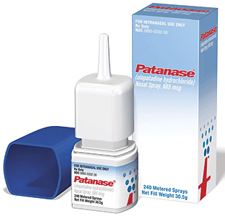Product
Patanase
Approval Date
April 15, 2008
Release Date
May 22, 2008
Company
Alcon
Class
Antihistamine (H1-blocker)
Indication
Seasonal allergic rhinitis
Active Ingredient
Olopatadine (as HCl) 0.6% (665mcg/spray); aqueous nasalspray; contains benzalkonium chloride.
MarketingStrategy/Execution
Alcon, which has staked out a positionin treating ocular allergies, hopes Patanase extends the franchise beyond eyes.Marketing creative may focus on the new nasal spray’s ability to make quickwork of nasal allergies. How quick? Try half an hour. The label allowsAlcon to tout relief from symptoms within 30 minutes, and Alcon’schief marketing officer has said he envisions Patanase finding an audienceamong patients who need and want a fast-acting spray that quickly relievessymptoms of seasonal allergic rhinitis, for which the drug was approved April15. The introduction to allergists and PCPs should emphasize fast onsetof action vs. steroids. As Alcon’s first nasal offering, look for Patanase toleverage the brand equity of Patanol, the most widely used prescription eyedrop for allergic conjunctivitis.
Physician Outlook
Patanase (olopatadine hydrochloride) nasal spray wasrecently approved by FDA for relief of seasonal allergic rhinitis symptoms inpatients 12 years and older. Rapid onsetof action is touted as a competitive advantage for this new entrant into thealready well represented nasal corticosteroid market where current brands areindicated for patients as young as 2 years of age but take longer to managesymptoms. Patanase’s most significantaccomplishment may very well be the entrée’ it provides manufacturer Alcon toexpand their topical allergy franchise beyond ocular remedies.
–Sue Ramspacher, Sr. Vice President, GfK Market Measures
Also in the Pipeline(according to Adis R&D Insight)
Drug: R 89674
Manufacturer: Vistakon Pharmaceuticals LLC
Indication: Allergic Conjunctivitis
Active ingredient: Alcaftadine
Phase: III
Drug: Bepreve
Manufacturer: Ube Industries
Indication: Allergic Conjunctivitis
Active ingredient: Bepotastine
Phase: III
Source: Wolters Kluwer Health
Pharmacology
Seasonal allergic rhinitis describes an array of symptomssuch as congestion, sneezing, itchy nose, and rhinorrhea caused by asensitivity to seasonal pollens. Olopatadine is an antihistamine that relievesthese symptoms by interfering with the inflammatory response to the allergens.This nasal spray formulation of the drug enables the patient to directly targetthe area of the inflammatory symptoms.
Clinical Trials
Three randomized, double-blind, placebo-controlled,parallel-group, multicenter, 2-week studies were conducted to establish thesafety and efficacy of olopatadine nasal spray in the treatment of seasonalallergic rhinitis. In these studies, 1,598 adult and adolescent patients weretreated with either olopatadine 0.4%, olopatadine 0.6%, or placebo (vehiclenasal spray). Efficacy was assessed by patient recordings of four separatenasal symptom scores (nasal congestion, rhinorrhea, itchy nose, and sneezing).Symptoms were recorded as reflective (symptom severity over the past 12 hours)or instantaneous (symptom severity at the time of recording) on a scale of 0 to3 (absent, mild, moderate, or severe). The primary efficacy endpoint was thedifference from placebo in the percentage change from baseline in the sum of AMand PM reflective total nasal symptoms scores, averaged over the 2-week period.In each trial, patients treated with the study drug (two sprays in each nostriltwice daily) had statistically significantly greater decreases in thereflective total nasal symptom score, compared to vehicle. For olopatadine0.6%, the changes from baseline in the two studies were –3.63 and –2.90,respectively, compared to –2.67 and –1.92 for placebo.
The onset of action was assessed by an instantaneous recording ofthe total nasal symptom score twice daily after the first dose of study drug.Onset of action was apparent after 1 day of dosing.
In three environmental exposure single-dose studies, patients wereexposed to high levels of pollen and then treated with either olopatadine nasalspray or placebo. They then recorded their allergy symptoms hourly asinstantaneous scores for the next 12 hours. In these studies, olopatadine 0.6%nasal spray had an onset of action of 30 minutes post-dose.
Adverse Reactions
Bitter taste, headache, epistaxis, throat pain, post-nasaldrip, cough, nasal ulceration, somnolence.
Adults
2 sprays in each nostril twice daily.
Children
Not recommended.
Precautions
Other nasal diseases: not recommended. Avoid eyes. Monitorfor nasal mucosal changes. Pregnancy (Cat.C). Nursing mothers.
Interactions
Potentiates CNS depression with alcohol, other CNSdepressants.








